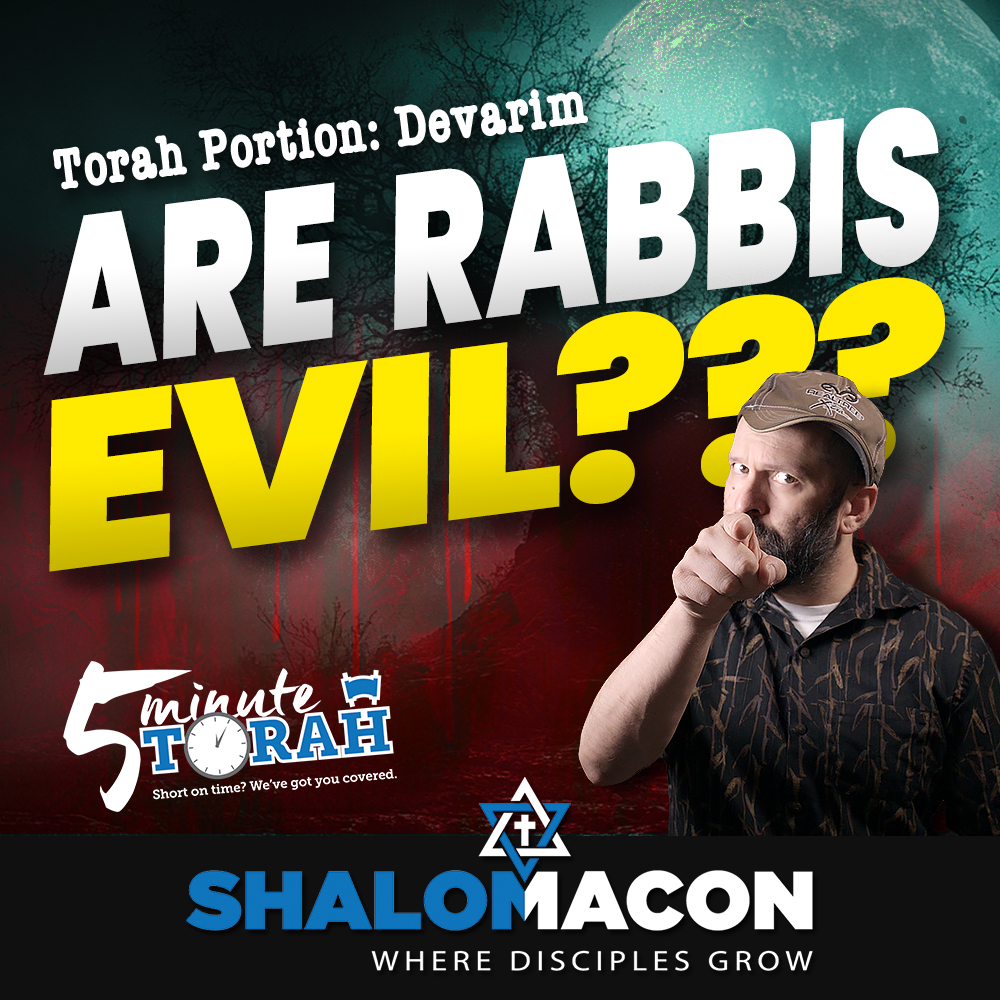[00:00:00] Speaker A: Those dirty rabbis, always making up new rules. Let me tell you something. Now they're holding the traditions of man over the word of God. They even have an oral law. That's what I call adding to the word of God. Sounds fishy to me, especially when Jesus said, call no man. Rabbi, no doubt you've heard this kind of criticism when you've introduced people to a messianic jewish perspective on the scriptures. How have you handled it? If you've been looking for an easy way to address questions like these, stick around for this week's five minute Torah.
Welcome back to another episode of the five minute Torah. Before we get into this week's Torah portion, I wanna let you know that this week's five minute Torah isn't going to be exactly five minutes long, because I'm not a legalist. And if you think I'm being a little too snarky, then you can go read your own Torah for five minutes and see how much you get out of it. This week, we begin the book of deuteronomy with the first portion of Devilrina. Deuteronomy one, 1322. And here are the three things that you need to know about it. Number 140 years in review. Lessons from the wilderness devil begins with Moses delivering a series of speeches to the Israelites, reflecting on their journey in the wilderness and recounting significant events from their past. Moses reiterates key moments, such as the appointment of leaders, the sending of spies into the promised land, and the rebellion at Kadesh Barnea. This section emphasizes the importance of the Israelites, remembering their history, learning from past mistakes, and reinforcing the covenant between them and God. Number two veiled rebukes the chastisement of Moses. Our sages tell us that some of the place names in this week's Torah portion are not to be taken literally, especially since we haven't heard of some of them before now. They're veiled rebukes that Moses uses against the children of Israel for their sins in the wilderness. One of these places, Dizzahav, is mentioned nowhere else in all of scripture. Dizzahav means too much gold. Can you guess what incident it might be referring to? Number three. Who sent who? The mystery of the spies. A few weeks ago, we learned about the incident of the spies bringing back the evil report about the land. The Book of numbers seems to say that the Lord sent the twelve to spy out the land. However, in this weeks Torah reading, we hear an alternative perspective that says that the Lord really wasnt the one who commissioned them. Your homework is to play Sherlock and unravel the mystery of the spies to find out what this discrepancy is all about. Enjoy. If you're looking for a place to learn, connect, and grow, then Shalom Macon is the place. It doesn't matter where you are in the world. You can find a connection with Shalom Macon through our live services every Saturday and through our private social network we call Shalom at home. Check us out on YouTube and on our
[email protected], for more information. We look forward to connecting with you and seeing you this Shabbat this week's Torah commentary is called Moses and the Rabbis and it comes from my book five minute Torah, volume two. Our Torah portion begins with the final book of the Torah, the Book of Deuteronomy. Sometimes the Book of Deuteronomy is also known as Mishneh Torah or the repetition of Torah, since it contains a recap of many of the major themes included in the previous books of the Torah. It also begins by recounting the various events that have taken place among the children of Israel since Exodus. A curious statement is made, however, that we must explore beyond the Jordan and the land of Moab. Moses undertook to explain this law, saying the children of Israel had wandered in the wilderness for the last 40 years and had now made it to the land of Moab on the east side of the Jordan. But rather than immediately sending them over, Moses stops and begins to explain some of the important details of the Torah. What were those details? Thats a really good question. Many people make the mistake of thinking that every detail of the Torahs instructions is spelled out within the Torah itself. However, we have plenty of examples of why this cannot be the case. The most obvious is that of Shabbat the Sabbath. For instance, the lord commanded the children of Israel to keep the Sabbath and that anyone who profanes the Sabbath shall be put to death. This is exodus 30 114 15. However, the Torah does not provide any details of what types of work are considered to violate the Sabbath. Since the elders of Israel are responsible for trying cases such as this to determine if the crime is worthy of such a serious decree as the death penalty, it becomes immediately apparent that the definitions of work and profaning the Sabbath are crucial in judging the outcome of such cases. Two questions immediately arise, what constitutes work? And two, who has the authority to interpret the definition of work? In other words, does each person have the ability to determine what is work for themselves? Or is there a common standard established that all of Israel must adhere to details and decisions like this had to be made clear to the Israelites before Moses departed. As we can see alluded to here in our portion. These details were explained to the children of Israel. See verse five, reminding them that the heads of these tribes had been given charge of making legal rulings on his behalf under the leadership of Joshua. See verses nine through 18, and that since their authority was given to them by Moses, it also came from Sinai, as recorded in Perchevot. Moses received the Torah from Sinai and transmitted it to Joshua, Joshua to the elders, elders to the prophets, and the prophets transmitted it to the men of the great assembly. This is from the tractate Avot one one. These legal decisions were at first recorded orally and then eventually written down at a much later date. They were passed down from one generation to the next in order to equip the leaders among the people of Israel. The oral law, or the Mishnah, therefore, is the compilation of legal decisions and case precedents passed down from generation to generation, beginning with the time of Moses, before it was ever written down. However, it was taught orally from teacher to student in order that it remained flexible but not forgotten. After the destruction of the second temple during the roman period, it became important for this information to be collected and committed to writing so that it not be lost. This compilation has served as a collective repository of these oral transmissions ever since. It's a critical component of Judaism, detailing the specifics of how the Torah is to be lived out and determining the legal definitions of what it means to either break or fulfill the commandments found within the Torah. The Torah was given as a skeleton, intentionally lacking in many details. How it is to be observed. It is the job of the rulers of Israel to put flesh on it by explaining how it is to be lived out. This is why Yeshua can confidently say, the scribes and the pharisees sit on Moses seat. So do and observe whatever they tell you. Matthew 23 two, three. These scribes and pharisees, in the days of Yeshua, would eventually become the rabbis of the Mishnah and the Talmud. Do they disagree with the decisions of Yeshua and the apostles? Occasionally, but not that often. We have to remember that sometimes lower courts and higher courts disagree, but it's always the higher court's ruling that stands. Even though the higher court may come to different conclusions than the lower courts, it does not disband the lower courts, but trust them to handle rulings until the time is needed for it to intervene. Yeshua entrusted the leaders of Israel to continue leading his people in his absence with the ultimate authority lying with him and his apostles. The next time we casually dismiss something as being rabbinic, lets remember that if Moses had to expound on the Torah to make it viable for those living in his day, how much more so do we need exposition of its principles today by those who have been entrusted with its wisdom? What do you think? Do you think this information will help others understand the place of jewish authority when it comes to interpreting Torah? What other ideas do you have that might help? Let me know in the comments below. Speaking of misunderstanding, Peter says that Paul's letters are difficult to understand. This is particularly true regarding his letter to the Romans. And if you want a better understanding of Paul and the book of Romans, then you need to check out our series repaving the Romans road and recommend it to your friends. It's guaranteed to change the way you read Paul, particularly the book of Romans. You can check it out using the link above or at the end of this video. I'll see you next week for another messianic insight into the eternal tour of God. Blessings from Shalom Macon, the place where disciples of Yeshua learn, connect, and grow.
[00:08:44] Speaker B: Please visit our website, shalommaken.org, to learn more about us. Join our live services, access other teachings, sign up for our newsletter, join our private network that will connect you with our greater community from around the world, or contribute to the work of Shalom Macon. Thank you for watching and we look forward to connecting with.



